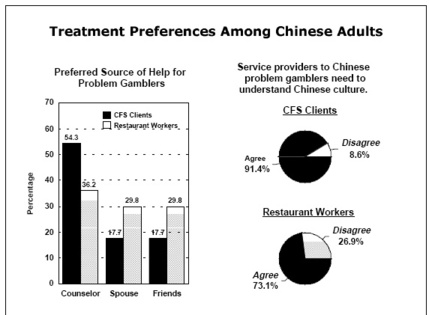The WAGER, Vol. 2(23) – Gambling in a Chinese cultural context
Gambling always occurs within a social and cultural context. In some Canadian cities (e.g., Toronto, Montreal), Chinese problem gambling treatment services have developed for the growing number of Chinese-speaking individuals in these cities. Ricky Sin* conducted an exploratory study examining gambling and problem gambling behaviors and attitudes among Chinese in Quebec. The non-random sample included 229 individuals who visited the Chinese Family Service of Greater Montreal (CFS) during a one-week period, and 56 Chinese restaurant workers. The results for the CFS clients showed that the longer a respondent had lived in Canada, the higher the SOGS score. There are several explanations for this finding. Chinese may develop higher rates of problem gambling while residing in Canada; however, this finding also could be a function of different cultural perspectives. For example, while playing mahjong may have been considered a social activity for some Chinese in their country of origin**, playing mahjong for money is considered gambling within a Canadian context. Respondents were asked about treatment preferences among Chinese-speaking problem gamblers. Although counseling is not a common source of help for many Chinese, a counselor was the preferred source of help for 54.3% of the CFS clients and 36.2% of the restaurant workers. The majority of both samples considered it necessary for those providing services to Chinese problem gamblers to understand Chinese culture. Providers who understand Chinese culture will be better equipped to treat problem gamblers within the appropriate social and cultural context.
Sources:
*Sin, R. (1996). Gambling and problem gambling among Chinese adults in Quebec: An exploratory study. Report prepared for Chinese Family Service of Greater Montreal.
**Au, P., & Yu, R. (1997, June). Working with problem gambling in the Chinese community: A Toronto experience. Paper presented at the 2nd Bi-annual Ontario Conference on Problem and Compulsive Gambling, Toronto, Ontario.
This public education project is funded, in part, by The Andrews Foundation.
